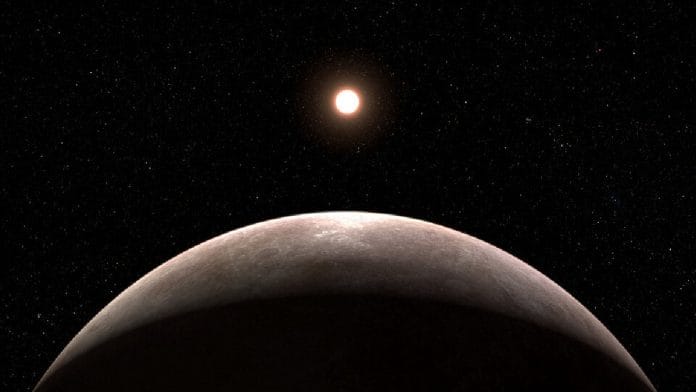New Delhi: NASA’s James Webb Space Telescope has, for the first time since its launch, spotted an Earth-sized rocky planet outside our solar system.
Formally classified as LHS 475 b, the planet is almost exactly the same size as our own — just about 99 per cent of Earth’s diameter.
The team from Johns Hopkins University Applied Physics Laboratory chose to observe this target with Webb after carefully reviewing targets of interest from NASA’s Transiting Exoplanet Survey Satellite (TESS), which hinted at the planet’s existence.
The fact that it is also a small, rocky planet open the door to many future possibilities for studying rocky planet atmospheres with the Webb Telescope, the researchers said.
Researchers used NASA’s James Webb Space Telescope’s Near-Infrared Spectrograph (NIRSpec) to observe exoplanet LHS 475 b on August 31, 2022.
Among all operating telescopes, only Webb is capable of characterising the atmospheres of Earth-sized exoplanets. The team attempted to assess what is in the planet’s atmosphere by analysing its transmission spectrum. Although the data shows that this is an Earth-sized terrestrial planet, they do not yet know if it has an atmosphere. However, they can tell that the planet does not have a methane-dominated atmosphere. Read more
Also Read: How new DNA software — used to create smallest pottery — will help create solar cell molds
Researchers at Indiana University have developed a new method to determine the average age that women and men had children throughout human evolutionary history using DNA mutations.
The study revealed that the average age that humans had children throughout the past 250,000 years is 26.9. Moreover, fathers were consistently older, at 30.7 years on average, than mothers, at 23.2 years on average, but the age gap has shrunk in the past 5,000 years, with the study’s most recent estimates of maternal age averaging 26.4 years.
The shrinking gap seems to largely be due to mothers having children at older ages.
The research can also help understand the environmental challenges experienced by our ancestors, and also predict the effects of future environmental change on human societies.
Other than the recent uptick in maternal age at childbirth, the researchers found that parental age has not increased steadily from the past and may have dipped around 10,000 years ago because of population growth coinciding with the rise of civilization. Read more
Also Read: ‘Is it a bird? Is it a dinosaur? It’s both. 120 mn-yr-old fossil sheds light on how birds evolved’
Scientists have discovered a new species of tortoise in Southwestern Madagascar which had a carapace measuring around 50 centimeters long, making it one of the island’s large tortoises.
Though the fossilised leg bone of the species was based was discovered more than 100 years ago, it was so far wrongly identified as the juvenile of the giant tortoise Aldabrachelys abrupta.
Only a DNA analysis recently carried out on the fossil revealed that the extinct reptile was a species in its own right, with researchers naming the species Astrochelys rogerbouri.
The name honours the late paleontologist Roger Bour, who was part of this project.
Like many other Indian Ocean tortoises, Astrochelys rogerbouri was likely driven to extinction by the arrival of humans on the islands, either during the arrival of Madagascar’s first inhabitants from Southeast Asia or more recently by European colonists.
The first tortoises to colonize the islands of the Indian Ocean are believed to have evolved around 40 million years ago on the African mainland. The animals are believed to have dispersed by floating in the sea, with living giant tortoises sometimes found washed up on beaches today. Read more
Scientists reveal detailed climatic history
By analysing Antarctic ice cores, scientists have revealed the most detailed look yet at the planet’s recent climactic history, including summer and winter temperatures dating back 11,000 years.
The study is the very first seasonal temperature record of its kind.
The study also validates one aspect of a long-standing theory about Earth’s climate that has not been previously proven: how seasonal temperatures in polar regions respond to Milankovitch cycles.
Serbian scientist Milutin Milankovitch hypothesized a century ago that the collective effects of changes in Earth’s position relative to the sun—due to slow variations of its orbit and axis—are a strong driver of Earth’s long-term climate, including the start and end of ice ages – before human influence began to have its effect on climate.
These more highly detailed data on long-term climate patterns of the past also provide an important baseline for other scientists, who study the impacts of human-caused greenhouse gas emissions on our present and future climate. By knowing which planetary cycles occur naturally and why, researchers can better identify the human influence on climate change and its impacts on global temperatures. Read more
(edited by Anumeha Saxena)
Also Read: How are stars like Sun formed? James Webb Space Telescope images hold key to new investigations






